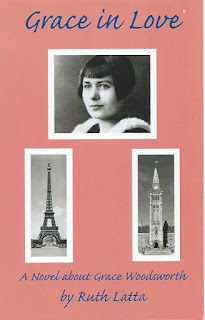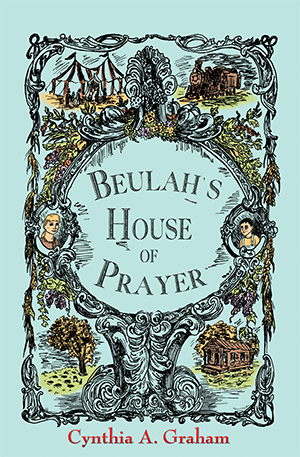 Having co-authored, with Joy Trott, the biography Grace MacInnis: A Woman to Remember, Ruth Latta is an expert on her subject. In Grace in Love, she holds a magnifying glass to a crucial portion of Grace Woodsworth MacInnis’s long life. Because Grace in Love is a novel, not a biography, some fictional characters mingle with the real ones.
Having co-authored, with Joy Trott, the biography Grace MacInnis: A Woman to Remember, Ruth Latta is an expert on her subject. In Grace in Love, she holds a magnifying glass to a crucial portion of Grace Woodsworth MacInnis’s long life. Because Grace in Love is a novel, not a biography, some fictional characters mingle with the real ones.
Tag: historical fiction
A review of Rome’s Sacred Flame by Robert Fabbri
 Throughout the reading my mind often reflected back to Colleen McCullough’s collection. She remodelled Gaius Julius Caesar to her own interpretation and I sensed the same thing happening with Robert Fabbri’s Titus Flavivus Vespasianus. In this book he wastes little time in dispatching friend or foe (including his brutalised wife) into the next world with his trusty gladius. I can understand why this is a bestselling series with an ever-growing audience.
Throughout the reading my mind often reflected back to Colleen McCullough’s collection. She remodelled Gaius Julius Caesar to her own interpretation and I sensed the same thing happening with Robert Fabbri’s Titus Flavivus Vespasianus. In this book he wastes little time in dispatching friend or foe (including his brutalised wife) into the next world with his trusty gladius. I can understand why this is a bestselling series with an ever-growing audience.
A review of Xaghra’s Revenge by Geoff Nelder
 Geoff Nelder is one of those writers who seems to be able to work across multiple genres seamlessly. There’s always an element of action, a hint of steamy romance, and his trademark twist. In his latest novel, Xaghra’s Revenge, the twist is a mixture of history, science, horror and fantasy. The research that underlies this novel is obviously impeccable. The narrative is built on the true story of Turkish pirate Rais Dragut, a brutal and deranged man who, in 1551, captured the entire population of Gozo, one of the Maltese islands, and sold whoever survived the terrible journey into slavery in Northern Africa.
Geoff Nelder is one of those writers who seems to be able to work across multiple genres seamlessly. There’s always an element of action, a hint of steamy romance, and his trademark twist. In his latest novel, Xaghra’s Revenge, the twist is a mixture of history, science, horror and fantasy. The research that underlies this novel is obviously impeccable. The narrative is built on the true story of Turkish pirate Rais Dragut, a brutal and deranged man who, in 1551, captured the entire population of Gozo, one of the Maltese islands, and sold whoever survived the terrible journey into slavery in Northern Africa.
A review of The Illumination of Ursula Flight by Anna-Marie Crowhurst
 This novel is more than just another a period piece of fiction. Crowhurst has written an evocative experience: a time-machine back to three and a half centuries ago into a world so unlike the present day that it actually become entangled and is essentially involved in generating our present heritage. This is set in a time before those childhood nursery rhymes were yet to be constructed as political satire and when the Dutch were the current adversary. Mix up the wrong potion and you could be accused of witchcraft.
This novel is more than just another a period piece of fiction. Crowhurst has written an evocative experience: a time-machine back to three and a half centuries ago into a world so unlike the present day that it actually become entangled and is essentially involved in generating our present heritage. This is set in a time before those childhood nursery rhymes were yet to be constructed as political satire and when the Dutch were the current adversary. Mix up the wrong potion and you could be accused of witchcraft.
A review of The Reason for Time by Mary Burns
 Burns’s novel is set in Chicago in 1919. Her choice of poem to quote at the beginning and set the tone for the story is inspired. “Working Girls”, by Carl Sandburg, is about the “river of young woman-life” in that city, as factory and office girls headed off to work each morning. He contrasts the “green” stream of young innocent energy with the “gray” stream of more experienced women who say, “I know where the bloom and laughter go, and I have memories.”
Burns’s novel is set in Chicago in 1919. Her choice of poem to quote at the beginning and set the tone for the story is inspired. “Working Girls”, by Carl Sandburg, is about the “river of young woman-life” in that city, as factory and office girls headed off to work each morning. He contrasts the “green” stream of young innocent energy with the “gray” stream of more experienced women who say, “I know where the bloom and laughter go, and I have memories.”
A review of The Summer Before the War by Helen Simonson
 In the end, one of the main characters enjoys a sober happiness, but under it “ran a thin vein of sorrow what millions like her would feel down the years.” To educate readers while entertaining them is no small achievement. Simonson deserves critical as well as popular acclaim for pulling it off in a subtle way.
In the end, one of the main characters enjoys a sober happiness, but under it “ran a thin vein of sorrow what millions like her would feel down the years.” To educate readers while entertaining them is no small achievement. Simonson deserves critical as well as popular acclaim for pulling it off in a subtle way.
A review of Beulah’s House of Prayer by Cynthia A Graham
 I would categorize this book as historical fiction first and foremost, though it is touted as magical realism. I had this in the back of my mind as I read, but other than Beulah’s mysterious arrival in town and her omnipresence for most of the rest of the book, the “magical realism” elements weren’t obvious—until the end. This is where Graham’s gift of storytelling shines through
I would categorize this book as historical fiction first and foremost, though it is touted as magical realism. I had this in the back of my mind as I read, but other than Beulah’s mysterious arrival in town and her omnipresence for most of the rest of the book, the “magical realism” elements weren’t obvious—until the end. This is where Graham’s gift of storytelling shines through
A review of The Yanks are Starving by Glen Craney
 The “bonus” in “Bonus Army” or “Bonus Expeditionary Force” refers to the bonus for wartime service, a tradition in the U.S. ever since the War of Independence. A law passed in 1924 during the Coolidge administration stipulated that World War I veterans were to get a bonus in the form of a certificate redeemable twenty years later. In 1930 and 1931, when the impact of the economic downturn following the 1929 stock market crash was making itself felt, unemployed veterans demanded their bonus immediately.
The “bonus” in “Bonus Army” or “Bonus Expeditionary Force” refers to the bonus for wartime service, a tradition in the U.S. ever since the War of Independence. A law passed in 1924 during the Coolidge administration stipulated that World War I veterans were to get a bonus in the form of a certificate redeemable twenty years later. In 1930 and 1931, when the impact of the economic downturn following the 1929 stock market crash was making itself felt, unemployed veterans demanded their bonus immediately.
A review of On Leave By Daniel Anselme
 Anselme’s approach is to dig deep into the attitudes and motivations of three soldiers who are home on leave, let loose in Paris for a week or two. He shows us the distance between civilians safely ensconced at home and combatants who are fighting an unpopular war – a situation we have since come to know only too well. For sure, there is no sanctuary: these three guys may as well be ghosts, they’re on their own. Adrift from lovers, friends and family.
Anselme’s approach is to dig deep into the attitudes and motivations of three soldiers who are home on leave, let loose in Paris for a week or two. He shows us the distance between civilians safely ensconced at home and combatants who are fighting an unpopular war – a situation we have since come to know only too well. For sure, there is no sanctuary: these three guys may as well be ghosts, they’re on their own. Adrift from lovers, friends and family.
A review of No One is here Except All of Us by Ramona Ausubel
 No One is here Except All of Us is an exquisite, circular tale that takes us back to where we started – where we all start – at birth, where we create the world afresh. It’s full of wonder even in the midst of the most dire tragedies. Beautifully written, full of pain and poetry, this is a book that opens histories most intense and painful moments and shows what survives: love and DNA.
No One is here Except All of Us is an exquisite, circular tale that takes us back to where we started – where we all start – at birth, where we create the world afresh. It’s full of wonder even in the midst of the most dire tragedies. Beautifully written, full of pain and poetry, this is a book that opens histories most intense and painful moments and shows what survives: love and DNA.